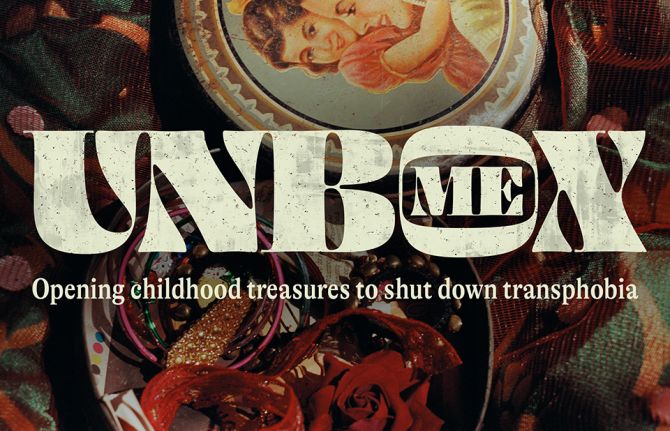

Press Statement
UNAIDS launches Unbox Me to advocate for the rights of transgender children
30 March 2022 30 March 2022GENEVA, 30 March 2022—In the lead-up to the International Transgender Day of Visibility, on 31 March, UNAIDS has launched an initiative to raise awareness among parents, teachers and the wider community about gender identity during childhood.
The Unbox Me campaign advocates for the rights of transgender children. Most children love to have boxes or hidden places in which they can hide precious trinkets or prized possessions safely and securely. The hidden objects can reveal a lot about the child—who he or she is, what he or she likes and what his or her dreams are. For some transgender children, this act of hiding treasures in a box becomes a way of hiding their identity from disapproving eyes. Unbox Me is about giving transgender children visibility. It is a call for inclusion and acceptance.
In India, more than 90% of transgender people leave their homes or are thrown out by the age of 15 years. Inevitably, many live on the street with no money or education, often relying on sex work. Despite the campaign originating from India, its theme of acceptance and inclusion is universal.
Transgender people around the world are often marginalized and experience discrimination and violence. As a result, transgender people have a 34 times greater risk of acquiring HIV than other adults. Up to 24 countries in the world criminalize or prosecute transgender people. For example, early in the COVID-19 response, some governments instituted gender-specific mobility days during lockdowns, which resulted in arrests against transgender people out on the “wrong” day.
Stigma, discrimination and criminalization tend to make transgender and gender-diverse people invisible, with extreme forms of discrimination leading to even the denial of the existence of gender-diverse people.
This campaign is part of an ongoing UNAIDS collaboration with advertising agency FCB India. Last year, UNAIDS partnered with FCB and released a successful short film, The Mirror, as part of the #SeeMeAsIAm campaign about a young boy looking in the mirror and dressing up as a woman. The film served to raise awareness among parents, teachers and the wider community about gender identity during childhood. Building on the film, Unbox Me seeks to bring home the reality of the many transgender children who are denied their true identity.
Swati Bhattacharya, FCB India’s Creative Chairperson, who conceptualized this campaign, said, “In India, children usually have a box which they use to store their most precious possessions, but in the case of transgender children they need to hide their box of treasures, since some of their most precious possessions don’t fit the gender norm that society expects them to conform to.”
UNAIDS works closely with the transgender community, civil society organizations and governments all around the world to decriminalize transgender people, secure their rights and ensure that they have access to health, education and social protection and that they are protected from abuse and exploitation.
“Many of us take our gender identity for granted, but for many children it is not so easy. It’s a matter of daily survival, a daily struggle,” said Mahesh Mahalingam, the UNAIDS Director of Communications and Global Advocacy. “Children all around the world must be supported in expressing their identity freely.”
In India, the Unbox Me campaign has garnered support among the education community. Teachers in many schools across India are using the boxes featured in the campaign as a conversation starter to raise awareness about gender identity.
Many prominent personalities and community leaders have also participated in the Unbox Me campaign, notably Indian film director Zoya Akhtar and television anchor Barkha Dutt.
UNAIDS is now extending the campaign to the global level.
If you would like to participate in the campaign or share your thoughts, contact UNAIDS at Communications@unaids.org.
UNAIDS
The Joint United Nations Programme on HIV/AIDS (UNAIDS) leads and inspires the world to achieve its shared vision of zero new HIV infections, zero discrimination and zero AIDS-related deaths. UNAIDS unites the efforts of 11 UN organizations—UNHCR, UNICEF, WFP, UNDP, UNFPA, UNODC, UN Women, ILO, UNESCO, WHO and the World Bank—and works closely with global and national partners towards ending the AIDS epidemic by 2030 as part of the Sustainable Development Goals. Learn more at unaids.org and connect with us on Facebook, Twitter, Instagram and YouTube.
